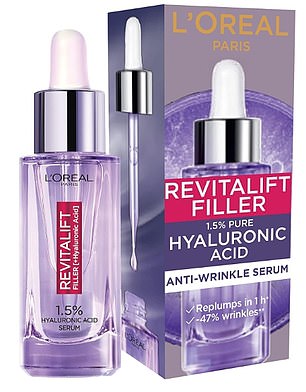- The ingredient found in serums and moisturizers is said to smooth wrinkles.
- Researchers say hyaluronic acid traps less water than previously claimed
<!–
<!–
<!– <!–
<!–
<!–
<!–
It is the “miracle” ingredient that promises to smooth wrinkles, improve elasticity and increase hydration.
But scientists say the benefits of hyaluronic acid, found in many popular skin care products, may be overstated.
It has previously been claimed that the ingredient, which absorbs moisture to form gels, can contain 1,000 times its weight in water.



Scientists say the benefits of hyaluronic acid may be overstated. The ingredients are found in many products, including anti-aging serum (pictured left) and moisturizers (pictured right). While it improves skin hydration, reduces wrinkles and increases plumpness, new research shows that hyaluronic acid traps drastically less water than previously claimed.
But while it improves skin hydration, reduces wrinkles and increases plumpness, new research shows that hyaluronic acid traps drastically less water than previously claimed.
A team at the University of California, Riverside, conducted a series of tests to find out if the claim was true.
Researchers Scott Borchers and Michael Purring measured the molecular binding properties of hyaluronic acid and water in a solution of 1 g of hyaluronic acid in 1,000 g of water.
They then compared the results to the thermal changes that take place within pure water during the same tests and found that they were almost indistinguishable.
“No experimental evidence has been found for any special ability of hyaluronic acid to retain water at the claimed level of one thousand times its weight,” the researchers stated.
“The origin of the fallacy that water binds at that level goes back to older literature that has been misinterpreted as to the meaning of binding, compared to other physical properties such as hydrodynamics.”
Oliver Jones, of RMIT University in Melbourne, Australia, told New Scientist that while most chemists probably already suspected the claims were exaggerated, it is useful to explicitly correct customers who may be misled.
In fact, previous studies have found that the amount of water that hyaluronic acid can trap is closer to 20 or 30 times its weight.
Skin care products containing hyaluronic acid often claim to “lock in” moisture, making the skin “bounce” and reducing fine lines and wrinkles.
Hyaluronic acid is produced naturally in the body. It helps retain moisture in the skin and eyes and lubricates the joints.
It also plays a vital role in wound healing by controlling inflammation and redirecting blood flow to damaged tissue.
Hyaluronic acid levels decrease as people age and this can contribute to the appearance of wrinkles and conditions such as osteoarthritis.

